Field Service Coordinator for National Bank of Serbia
Dejan Mauka has extensive experience maintaining, installing, and servicing banking equipment. He works for NBS (National Bank of Serbia) as a field service coordinator and is based in Serbia.
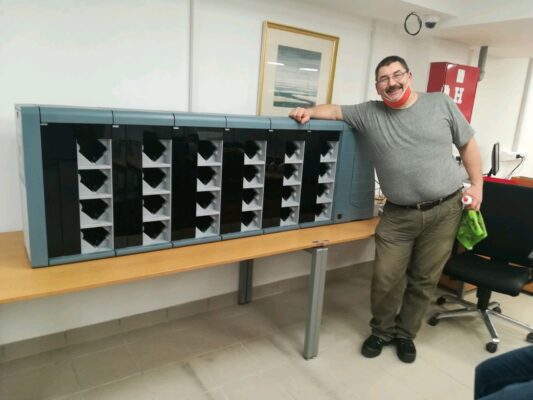

Background and path to field service
Were you interested in how things worked when you were a child? Did you like taking things apart?
I remember that until I started to go to school, almost every toy I received was disassembled and some of them were then assembled again with some minor improvements. Not just my toys, but some of my father’s things were also “improved”. Later, I was attracted to doing lots with wood, making some simple furniture, a bird house etc.
Are other people in your family engineers or technical?
My cousin is also technical, and an automation technician. However, I don’t remember that we talked about our jobs at any time in the past. We don’t need to talk when we start to work on something because both of us know what to do at each moment and stage of the job and can communicate that way.
Has there been a particular person who has inspired you?
My father was the person who inspired me to become an automation technician and to do what I do today. He was a “Jack of all trades”. We have a family home in the countryside, using lots of different machines and tools he always did all the repairs himself. Later, he allowed me to help him and, at the age of, maybe 15, he took me with him to our neighbour’s to help him with domestic equipment, mainly electrical devices.
Experience as a Field Service Technician
You have experience working with building, manufacturing, automation, and maintenance. Do you think having a variety of experience makes you better at field service?
Every field technician must take all the experience they can get from everybody and from every situation. Also, it`s important to develop critical thinking about everything because that is the way to remember all the important stuff. Then you can separate more or less the important things to do on site during a field service call.
Also, this is a good thing to do anyway as it gives you the opportunity to do more different types of jobs and to be successful in many different roles.
Do you think having a variety of experience helps you when problem solving in your current role?
In some cases, you can use experience from one job to another, but only if you can take the essence from the job situation. One very useful thing is experience in the organisation of a job, in an approach to different people and to be able to work with everybody. The basics of my job are the same in lots of situations but there is always something new and specific to tackle.
As you work in the banking industry, are there extra regulations you have to follow when maintaining the equipment?
Of course, the banking industry is specific in some ways.
Firstly, there is a security background check. You cannot be security cleared by the Institute for Manufacturing Banknotes and Coins if you have something on your record from the past.
Working with printing banknotes is a job which needs an extra responsible approach. Later in my career, I started to work with counterfeit banknotes, to understand how to check the difference and all the security features of domestic and some international banknotes.
I have had the opportunity to enter several vaults in different banks and, in this job, it is important to see banknotes as merchandise, not as value. For me, when I’m inside a vault, banknotes are just coloured paper, nothing more.
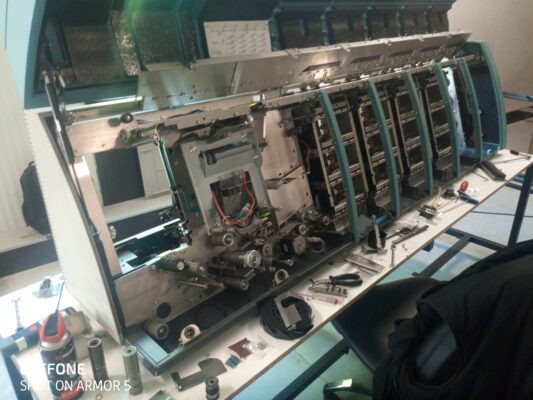

Experience as a Field Service Coordinator
What exactly does your current role involve?
My current position is field service coordinator in the national bank. So, my job involves the following:
organise regular maintenance of banknote processing machines,
investigate in some cases when machines stop during production,
check and organise spare parts for machines,
organise procurement for tools, and for some specific materials etc.
Also, I’m responsible for the training of operators and service staff. I follow the latest news from the banknote processing industry and try to implement them in the national bank.
As a national bank we also give approval to different banknote processing machines to enter and operate in Serbia, with domestic currency.
How much of your role remains ‘hands-on’?
Considering that banknote processing machines are very sensitive, with lots of small parts, lots of sophisticated sensors, and lots of mechanical parts, doing anything on the machine demands capability to work with your hands. But when you need to find the cause of a problem, you must use some special software tools.
For that purpose, I managed to finish a MCSA (Microsoft Certified Solutions Associate) course during my career.
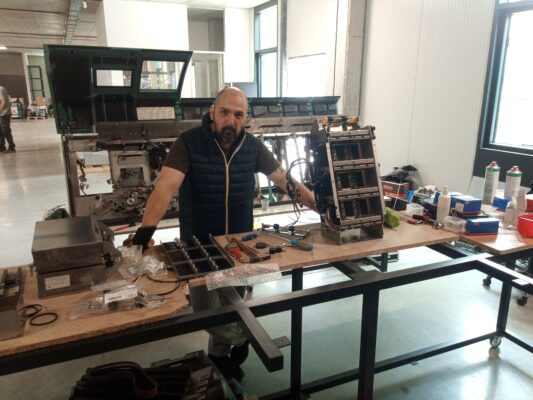

Working within a large organisation
Which other people in the organisation do you work with?
My first and closest colleague is my “student”, he is smart and has lots of experience now so he can do most of the maintenance by himself. But, this job, the job of field service is, from my experience, a “one man job”. There are many reasons why this is so. The main reason is responsibility, which you can’t share with another person. Considering that we must work with lots of fine adjustments, it’s impossible that they can be made by more than one person.
As you work for a large organisation, are there sometimes issues with getting things ordered?
In a large organisation, usually you must make a plan at the beginning of the year for all you need during that year. Then, you must wait for procurement to organise and carry out buying all the stuff, and sometimes they just fail to provide all you need. Then if you get a problem which you can’t predict, you are in trouble. That is the moment to use all your knowledge to solve the problem and to keep processing banknotes.
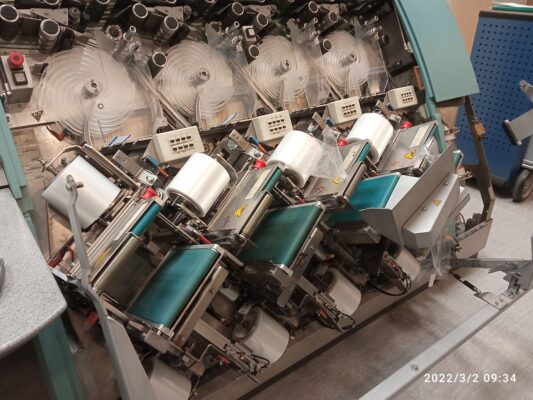

Equipment
What sort of equipment do you install, service, and maintain?
The major type of equipment is banknote processing machines. The biggest one is a Giesecke and Devrient BPS M7. There is also the BPS 1040S, an excellent system from the same manufacturer. As well: BPS C4 and lots of smaller machines for counting, packing, some compressors for machines, vacuum pumps etc.
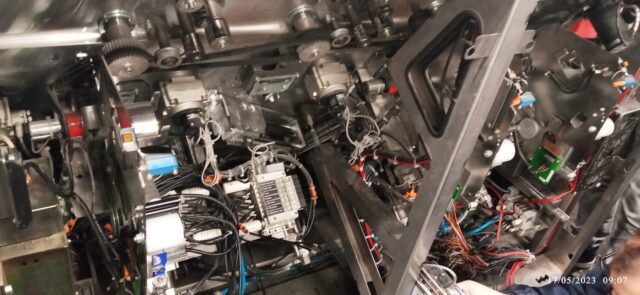


Which currencies do your machines count? Are there any currencies they cannot handle?
All our machines have been adapted for the RSD (Serbian dinar). Some of them also have the ability to work with the Euro. The differences are in fact that we, as the national bank, have exclusive rights to destroy old, unfit banknotes and to declare counterfeits. Business banks can also use banknote processing machines, but they can’t do the elimination of unfit banknotes. This is only in the case of the RSD. In the case of the Euro, we don’t destroy anything, but classify it and send it back to the EU.
Small machines which are used by exchange offices, usually have some combination of multiple currencies. This depends on exchange office politics and regions. Those combinations come as packages by order from the manufacturer of machines. We do not check this software, but all of them are approved by the ECB (European Central Bank).
What do you think will be the biggest change in the equipment you work on in the next five years?
I don’t believe there will be any major changes in this industry in the immediate future. This is for three reasons:
Firstly, large systems have achieved the greatest possible speed (about 30 billion/sec), any faster will tear banknotes apart.
Secondly, the world trend is to reduce the number of physical banknotes for lots of reasons – introducing e-banking etc.
Thirdly, products from China and other countries in the Asian region are cheaper and give similar security.
Maybe some new security features on some of the currencies could mean that there are some changes but nothing very big.
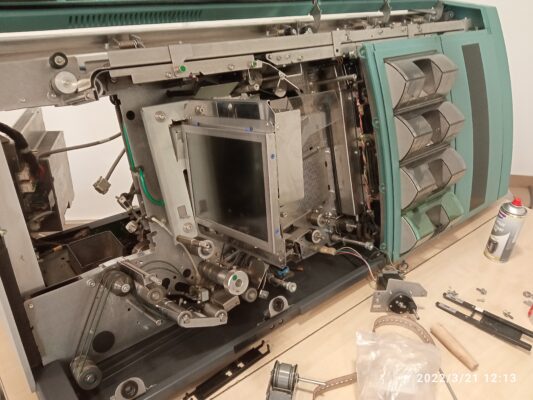

Digitalisation
How are you being impacted by digitalisation?
So far, digitalisation is not an issue. Of course, lots of people are starting to use cards more and more but physical bank notes are still used in a lot of transactions.
Has your job changed now that fewer notes need to be counted and processed?
Not really, and I believe that, during my career my job will remain the same. Also, if something changes in the short term, I can always switch jobs and repair and maintain automation systems in many different industries. I could even work for a private company for home appliances, if needed.
Typical week
What’s your typical week like?
My typical week depends on some external factors, but usually it’s regular maintenance regulated by the manufacturer of the machines. This includes cleaning, disassembling some parts to check for exhaustion, if it’s necessary replacing some parts and making some adjustments.
We are ready all the time to go on site if we get a call about a problem.
If we need to travel to a branch office, we prepare everything the day before. We then start early in the morning because all our branch offices work the day shift only so we must complete our field service within the same day. Otherwise, we can’t check if the machine is operable for the next day.
How much of your time is spent on technical work and how much with administration and other tasks?
Luckily, we don’t have to spend much time on administration. As it’s a big organisation, there is always somebody who can do the administrative tasks as part of their job. We have some reports to prepare, but that only usually takes 30 minutes.
Which other parts of the company give you support?
As we are a maintenance function, we sometime work with building maintenance, especially during the installation of machines on site. Sometimes, we use their equipment to finish some small jobs, but in return we give them support in areas where they need it (some special measuring equipment, some tools etc.).



Most challenging part of the job
What do you find most challenging when you are working – technical side, people, or logistics (travel etc.)?
For me personally, the most challenging part of my job is to work with people. In Serbia (but I believe in some other countries too), lots of people have some knowledge regarding technical issues, or believe they have. That’s why, when I approach the machine with the problem, I always ask the operator directly what they saw, heard, and what the problem was. Then I tell the operator to take a break, (breakfast, cigarette, anything) and I will let them know when it is OK to get back to work.
I like to travel, so that is not a big problem. Dealing with all the other logistics is something which comes with years of experience.
What has been your most challenging job?
The most challenging job in my case is the general repair of BPS (Banking Business Process) systems of any kind. Sometimes after a few years, we need to do a general repair, which means that we usually disassemble the whole system, change lots of parts, make some software backups, install some adaptations and other software etc.
We usually need one or two weeks for the big systems and one week for the smaller ones. We must prepare everything and then get a green light from production that we can stop the machines for such a long period.
Have you ever arrived on site and found that it was much easier than you expected? For example, did you ever need to simply switch on a machine
I worked for three years as a private contractor for business banks and had that situation a few times in the beginning when operators were still not experienced enough to do some things by themselves. Sometimes it was a small jam of banknotes, or wrongly placed parts which they removed during daily cleaning etc. Sometimes I travelled 4 hours and removed the banknotes in 5 minutes. But that didn’t happen often.
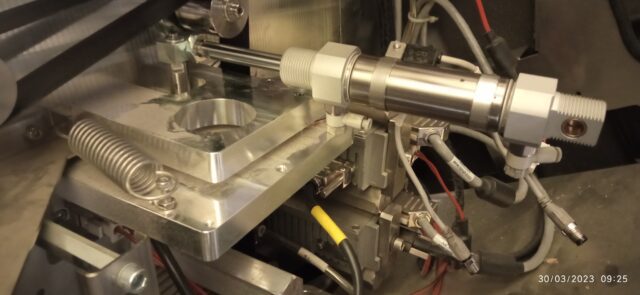

Health and Safety
Are there particular health and safety rules you need to follow in terms of security because of the types of equipment you are working with?
Working with banknotes is dirty work. People don`t think about that but cash is one of the dirtiest objects which you can touch. I saw some microscopic pictures of banknote surfaces in the Giesecke+Devrient office in Munich, made by an electronic microscope. It looked like a huge city with lots of different life forms on the surface. Scary, indeed.
So, we use masks during our work. One of the first rules about the maintenance of banknote processing systems is: do not use high pressure air to clean, ever, only use a vacuum cleaner and cloths. Dust particles from the parts of a banknote processing machines are small but very dangerous, containing poisonous dyes and other chemicals and all the bacteria and viruses you can imagine.
There are dangerous power supplies and sometimes you have to work while the machines are switched on and that requires additional caution.
Making a winner
What makes the type of field service technician/engineer who is tomorrow’s senior engineer?
Firstly, you must love what you do. There is no substitute for that. Then, you must:
have good basic knowledge about automation systems,
be skilled with different tools (even if your family has said no place for any more new ones),
love challenges,
get satisfaction after the machine starts to work and everything is fine.
This work is passionate work.
How important are communication and people skills?
In my opinion, people skills are not so important in this job. That is because you are not repairing people but machines. A machine can`t change his mind in the middle of work, a machine has strict rules, and a machine is easy to understand. Of course, you need to communicate with people but, in my case, I keep that communication on a low level when we speak about work.
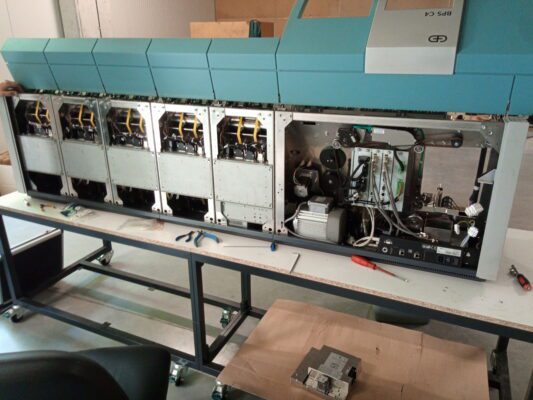

Training and mentoring
How important is ongoing training?
Training is very important, and I had the great luck to have one of the best engineers to lead me through my training in Munich, his name is Max Trippel. We spent a lot of time in discussion about systems, about the best approach to solving problems and he gave me some knowledge about “secrets” regarding the machines. So, I learnt from his experience, and that is the best way. We also stayed friends after that, and I was happy to be his host during his visit to Belgrade.
Unfortunately, after that, even when we have had official training, it has not been as detailed as the first one. But, in my job I meet some very nice guys, field service engineers (from Ukraine, Poland, Russia, Romania), who are willing to share their knowledge and to discuss techniques used for repair and maintenance. This exchange of experience is better than any training.
How key is it to have a mentor and a good team supporting each individual technician/engineer?
A mentor is very important as I mentioned before. My mentor was somebody who always asked, “Why?”, when I suggested something or gave an answer to one of his questions. That way, he always kept me alert and focused on the problem. This is something that I try to use as my modus operandi in work with younger technicians. Always explain why you are doing something, and, in that way, you will always correct yourself if needed.
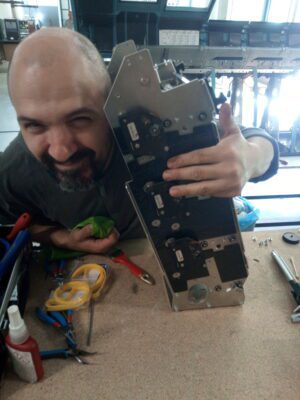

New field engineers
What advice would you give to someone who has just started their first job as a field technician? Or is considering moving into this field?
I will repeat myself; you must love what you are doing. You must look on any new problem as an adventure which you must win at the end. I think that you can learn from everybody: from some people how to do things and from some people how not to do things. You must use as much imagination as you have for this work and be the one who solves the problem. That is all the machines need and all the customers need.
Conclusion
Something I have taken as my motto but not written by me personally, but found online:
“If I do a job in 30 minutes, it’s because I spent 10 years learning how to do it in 30 minutes.
You owe me for the years, not the minutes.”
Further reading
Alvaro R Hernandez Mendez Tetra Pak production line Field Service Engineer


Responses